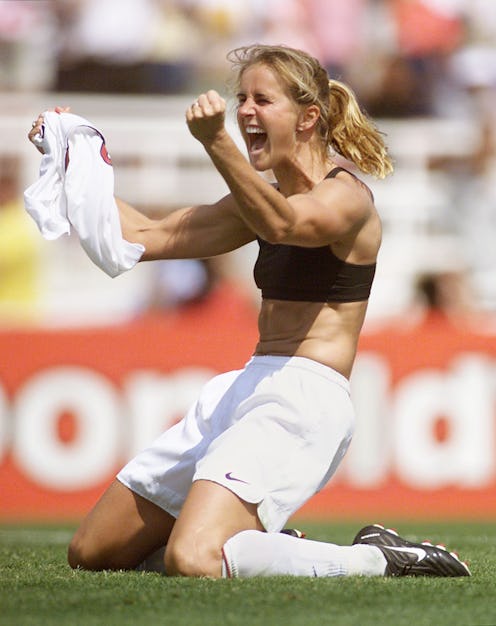News
What Brandi Chastain's Donation Means For Women
Debate over how sports-related injuries impact the brain in the long-term continue to dominate men's sports; after all, dozens of NFL players have been posthumously diagnosed with the degenerative brain disease chronic traumatic encephalopathy, or CTE. However, little scientific research has been done on how chronic head trauma affects female athletes, typically thanks to the justification that women participate in contact sports far less than men do. One woman is looking to change that: Soccer star Brandi Chastain will donate her brain to science for concussion research, she announced Thursday.
The two-time Olympic gold medalist became famous after her dramatic penalty shot at the end of the 1999 World Cup final clinched the game, and the title, for the U.S. national team. Despite officially retiring from soccer in 2004, Chastain has continued to be a positive role model for female athletes. Her decision to donate her brain to the brain bank run by the Concussion Legacy Foundation, the U.S. Department of Veterans Affairs, and Boston University's School of Medicine will be a major boon for women. Chastain told the New York Times she hoped her donation would benefit future athletes:
If there’s any information to be gleaned off the study of someone like myself, who has played soccer for 40 years, it feels like my responsibility — but not in a burdensome way. People talk about what the ’99 group did for women’s soccer. They say, 'Oh, you left a legacy for the next generation.' This would be a more substantial legacy — something that could protect and save some kids.
While talk of head trauma has largely centered around male NFL players, studies have shown that female athletes are more likely to sustain concussions than their male counterparts even in technically non-contact sports like soccer, hockey, and basketball. A 2015 study of collegiate athletes found the highest rate of concussions was actually reported by female hockey players. But of the 307 brains examined by the University of Boston researchers, which heads up CTE research, only seven belonged to women.
"Brandi Chastain's decision to donate her brain to further research is a powerful and courageous act that will ultimately improve the future health of female athletes, military veterans and other women who experience repetitive brain trauma," said Ann McKee, a neurology and pathology researcher at Boston University, in a statement released by the Concussion Legacy Foundation, as reported by ESPN. "We currently know so little about how gender influences outcome after trauma; her pledge marks an important step to expand our knowledge in this critical area."
Chastain is only the second woman to donate her brain to science, following in the footsteps of Cindy Parlow Cone. Their sacrifices will benefit women by allowing scientists to begin to address the under-explored area of female brain injuries and answer questions related to how gender might impact the effects of trauma.
